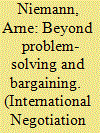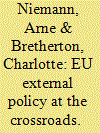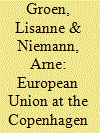|
|
|
Sort Order |
|
|
|
Items / Page
|
|
|
|
|
|
|
| Srl | Item |
| 1 |
ID:
076024


|
|
|
| 2 |
ID:
127017


|
|
|
|
|
| Publication |
2013.
|
| Summary/Abstract |
The goal of this Special Issue is to improve our conceptualisation and empirical understanding of EU actorness and effectiveness in International Relations. While the European Union aspires to play a greater global role, its actorness and effectiveness cannot be taken for granted given the nature of the EU as a multi-level and semi-supranational polity encompassing 28 Member States with diverse foreign policy preferences. The EU is presently at an important crossroad. On the one hand, its external policy stature and capacity have been boosted by institutional innovations and by the Union's increased involvement in the full spectrum of international issues. On the other hand, a number of factors cast doubt on the EU's real external policy actorness and effectiveness: slow and often only modest internal reforms, an increasing politicisation of formally 'low politics' issues, the prolonged sovereign debt crisis in the Eurozone, and a less favourable external environment, with the US shifting its focus to the Asia-Pacific region and emerging powers creating a more polycentric world order. In view of these changes and subsequent developments in the scholarly literature, our aim is to re-evaluate earlier conceptions of EU actorness. Central to this re-evaluation will be a shift in focus from notions of actorness to effectiveness. This introductory article will unpack and further elaborate the issues raised in this abstract by delineating the EU as an international actor in the empirical context, by reviewing the existing conceptual literature, defining and conceptualizing key notions and by providing an overview of the contributions to this Special Issue.
|
|
|
|
|
|
|
|
|
|
|
|
|
|
|
|
| 3 |
ID:
127049


|
|
|
|
|
| Publication |
2013.
|
| Summary/Abstract |
This article analyses the extent of European Union (EU) actorness and effectiveness at the 15th United Nations Framework Convention on Climate Change (UNFCCC) Conference of the Parties (COP) meeting in Copenhagen in December 2009. Although the EU has been characterised as a leader in international climate policy-making for some time, the COP 15 meeting in Copenhagen has overall brought about disappointing outcomes for the Union. This casts doubts on EU actorness and effectiveness in this field. We take the article by Jupille and Caporaso as a conceptual point of departure and then specify a more parsimonious actorness framework that consists of coherence and autonomy. Effectiveness is conceptualised as the result of actorness conditioned by the 'opportunity structure', that is, the external context that enables or constrains EU actions. We hold that EU actorness was only moderate, especially given somewhat limited coherence. In terms of the opportunity structure, we argue that the strong involvement of other important actors with rather different positions adversely impacted on EU effectiveness, along with a high degree of politicisation that constrained the European Union's ability to negotiate effectively.
|
|
|
|
|
|
|
|
|
|
|
|
|
|
|
|
| 4 |
ID:
109174


|
|
|
|
|
| Publication |
2011.
|
| Summary/Abstract |
This article analyses the degree of European Union (EU) actorness within the Group of Eight (G8). Drawing on the work of Jupille and Caporaso, actorness is probed along the criteria of recognition, authority, cohesion and autonomy. We argue that the vague, flexible and informal nature of the G8 has contributed to rather nuanced and ambiguous degrees of actorness. When assessing the above criteria, overall the EU's actorness remains questionable. As for recognition, while the EU is treated as an equal by other G8 delegations, actual membership remains disputed, and third parties such as the media remain reluctant to accept EU representation as equal. Authority in terms of legal competence tends to be of lesser importance in the G8, given the informal nature of this institution. Informally, the Commission has managed to enhance its authority when it can provide substantial expertise. Cohesion has proven perhaps the most limited aspect of EU actorness. Although value cohesion is substantial, there are no formal mechanisms that tie the European participants together. Commission autonomy in the G8 is considerable in terms of its own separate institutional apparatus, as well as formal performance and compliance scores that differ from those of the European G8 members. However, ultimately the Commission's freedom of action usually remains subject to the control of its principals. Yet, EU actorness tends to differ per context as our tentative analysis of the factors conducive to autonomy indicates.
|
|
|
|
|
|
|
|
|
|
|
|
|
|
|
|
| 5 |
ID:
159782


|
|
|
|
|
| Summary/Abstract |
This article concludes this special issue on the European Union as international mediator that set out to advance our theoretical and empirical knowledge about EU mediation. Providing a comprehensive reflection of EU mediation activities and the diverse settings where they take place, this concluding article identifies some connection points between the articles and discusses their findings on the motives/drivers, roles/strategies, effectiveness and institutional capacities of EU mediation. It discusses the implications of these findings for policymaking, focusing on the conditions for EU mediation effectiveness, the advantages of the multi-layered nature of EU mediation and the need for flexible adaptation of mediation strategies. Finally, the article sets the scene for future research endeavors on EU mediation by identifying three future research avenues that focus on the politics, domestic effects and comparative advantage of the EU as international mediator.
|
|
|
|
|
|
|
|
|
|
|
|
|
|
|
|
|
|
|
|
|